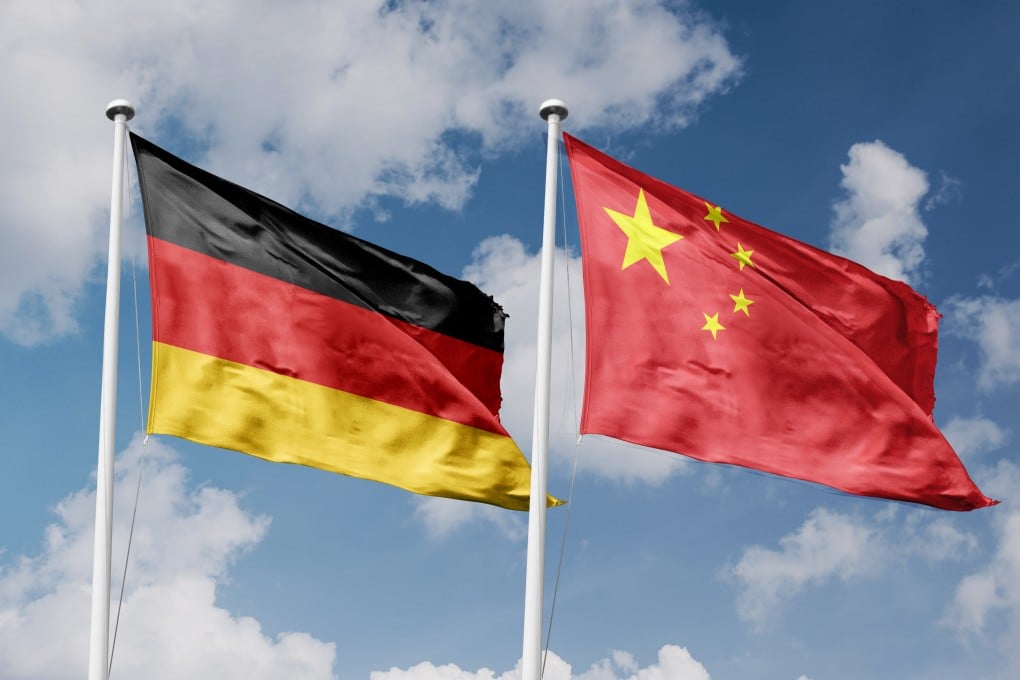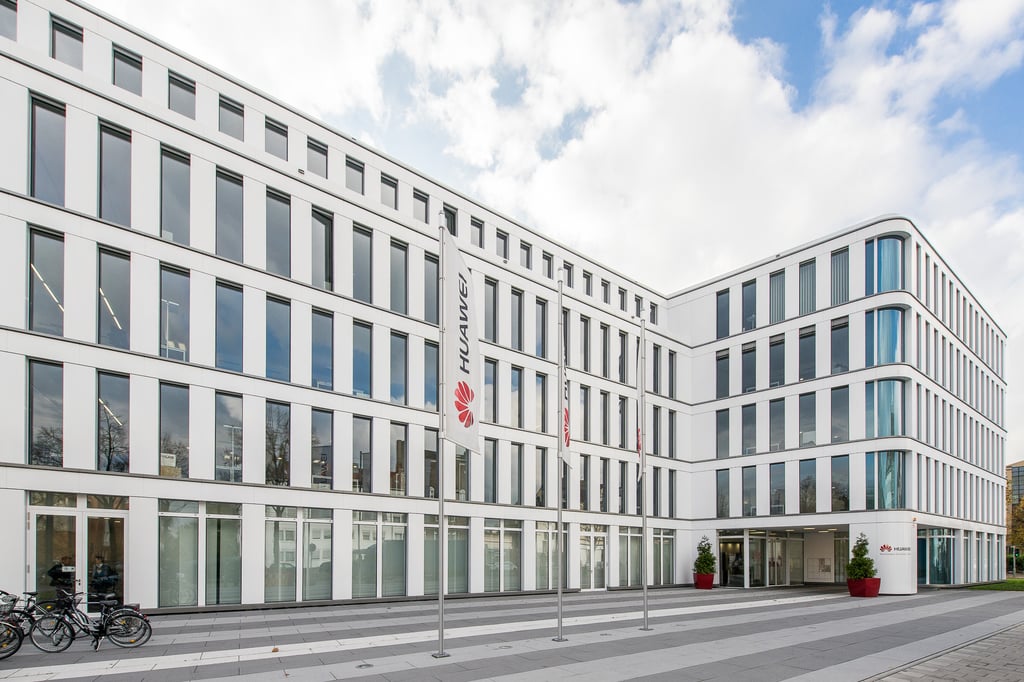Why global partnership with China remains vital for growth of Germany’s digital future
- Latest ‘Business Confidence Survey’ shows 91 per cent of German firms will continue to trade in China, with 54 per cent to boost investment despite slower growth
- Amid concerns over further collaboration, Chinese ICT company Huawei Technologies remains reliable partner in developing Germany’s mobile connectivity

China and Germany have both benefited significantly from their bilateral trade relationship over the past few decades. The European nation’s industrial and engineering expertise has helped drive the growth of China as a manufacturing powerhouse.
Over the years, China has also become increasingly important for German companies as an innovative driver in research and development (R&D).
In turn, Germany’s digital transformation has been facilitated by leveraging a global supply chain. Chinese electronic components, telecoms equipment and other technology have played a key role in this transformation. Last year, China was Germany’s largest trading partner for the eighth year in a row.
Discussions in the European Union have raised the issue of “de-risking”, to reduce the bloc’s economic dependence on China, during the past two years. Yet critics believe this stance ignores the mutual economic benefits brought about by this free-trade-based global cooperation.
German Chancellor Olaf Scholz, during last month’s three-day visit to China – his second trip to the country in less than 18 months – highlighted this point by calling for “pragmatic” economic relations between the two nations.
His visit kicked off on April 14 with him inspecting Bosch Hydrogen Powertrain Systems (Chongqing) – a joint venture between the German engineering and technology company Bosch and Chongqing-based premium commercial vehicle manufacturer Qingling Motors, which was set up in 2021 to develop, assemble and sell hydrogen fuel cell systems in China.

Chinese President Xi Jinping met the German leader in Beijing on April 16, during which he noted that “the industrial and supply chains of China and Germany are deeply intertwined, and the markets of both countries are highly interdependent”, according to the Chinese foreign ministry.
Xi also said there was huge potential to be tapped by pursuing cooperation in both traditional sectors, such as machinery and car manufacturing, and new areas including green transition, digitisation and artificial intelligence.
Scholz was accompanied on his trip by executives from many leading German corporations, including Volkswagen, which on the eve of the trip had announced new investment totalling US$2.67 billion in its production and innovation hub in Hefei, in China’s Anhui province.
Support for Sino-German cooperation still strong
Although the Chinese economy has faced substantial headwinds in recent years, German companies recognise the need to participate and remain competitive in this market. According to the German Chamber of Commerce in China’s “Business Confidence Survey 2023/24”, 91 per cent of German companies planned to continue doing business in China, with 78 per cent expecting consistent growth in their industry in the coming five years.
Up to 54 per cent of the firms planned to increase their investment, with 79 per cent of them believing this was necessary to remain competitive in China.

“We know very well that the German economy is export-oriented,” said Christian Sommer, CEO of the German Centre for Industry and Trade Shanghai, which enables German firms to operate in China and integrate themselves in the local business ecosystem. The centre provides these companies with co-working office space, meeting rooms, business advice and networking opportunities.
Given the country’s focus on exports, German companies have a strong need to remain competitive in foreign markets. “The Chinese market, by population, is a lot larger than the German one,” Sommer said. “Therefore, for long-term growth, it is very important German companies continue to further engage themselves in China.”
This means developing capabilities and making use of the best-in-class technologies found across the globe. “If we do not incorporate the technological developments from China – or from any other country – into German products, we will ultimately lose our customer base,” he said.
Over the past few decades, both China and Germany have derived significant economic benefits from their free-trade-based cooperation. German car manufacturers including BMW, Mercedes-Benz, Volkswagen and Audi have all had success after investments in the Chinese market.
This cooperative spirit has also allowed new joint ventures to be set up – most recently, with German supplier Bosch Rexroth, which has been active in China since 1978, signing an agreement with Zhejiang Hechuan Technology to strengthen its automation business in China.
Discussions over telecommunications provision
Similarly, Chinese companies have expanded their presence in Germany over the years, and have proved to be drivers of digital innovation. For instance, Huawei Technologies, a Chinese information and communications technology (ICT) company, has been operating in Germany for over 20 years and has played an integral role in delivering antennas and base stations to build Germany’s 5G network.

Despite these mutual business benefits, there has been some resistance to the growing collaboration between Chinese and German companies. Last September, for example, Germany’s Interior Ministry put forward a proposal to restrict the use of components produced by Huawei and ZTE, another Chinese telecommunications equipment company, in the country’s 5G networks. It cited security risks as the primary reason in wanting to prevent Germany from being too reliant on the products of any one country.
Germany’s energy crisis over gas supplies has also been used to argue against the reliance on international partners in its telecoms sector. However, Carsten Senz, Huawei’s vice-president of corporate communications, said that the two situations were entirely different.
“When you’re delivering gas, you can just turn it off,” he said. “On the other hand, our components are already in the network and they’ve been running for years, and will continue to run.” Huawei’s telecommunications equipment has been used in Germany’s domestic market since 2001, and has helped the company gain a reputation as a reliable business partner.
Senz said that the argument to stop using Huawei’s technologies held little weight given the company’s track record. “We are the most audited company in our industry and we also have a very good security record,” he said.
“Huawei technology is used in over 170 countries. In Germany, we have been reliable partners for our customers for 23 years. There have never been serious incidents with our technology and we always cooperate with the responsible authorities to ensure that our products fulfil all objective security criteria. I think that’s why there are just no rational reasons why we should be excluded.”
Need for objective evaluation of risks and benefits
He also emphasised that German network operators had taken comprehensive security measures to ensure that no one could control a network remotely; even supply interruptions were mapped as part of professional risk management. “It is completely unclear what problem some people want to solve by excluding Chinese vendors that has not already been solved by intelligent risk management,” he said.

Senz said that Huawei had always worked with independent institutions on cybersecurity, including Germany’s Federal Office for Information Security (BSI). The company operates a Cyber Security Innovation Lab in Bonn, where the BSI is located, which is open to authorities, customers, and independent third-party testing organisations to perform their own objective security tests and verifications.
Huawei has been playing an important role in Germany’s 5G network development. The “Great Mobile Network Test 2024” report, published last December by Germany’s Connect magazine, and the engineering and consulting services provider Umlaut – now part of the global professional services company Accenture – tested the telecoms networks in the country and found that the three operators, Deutsche Telekom, Telefónica and Vodafone, had all made significant progress in 5G roll-outs to greatly improve connectivity quality in big cities and towns.
With this in mind, it appeared that restrictions on the use of foreign components would cause more harm than good for Germany’s telecoms industry, Sommer said. “I think it is undisputed that Huawei has leading 5G technology,” he said. “If we choose not to [use] the front-running technology, then we have to accept that our whole industry will struggle to remain competitive.”
The ideal way forward would be for risk concerns to be objectively evaluated by experts, he said. “I would always say let the IT [information technology] specialists and German telecoms companies speak. We have to ask the experts what kind of concerns they have, and I believe they will tell us the reality of the situation.”
Sommer said that taking such an approach would help to overcome any biases created by the negative sentiment about an over-reliance on using foreign-made technologies.
Looking at the situation from a wider point of view, he said that restrictions on the use of foreign components could shift the trajectory of Germany’s digital future. “It would definitely affect digitalisation and the further development of Germany’s economy.”